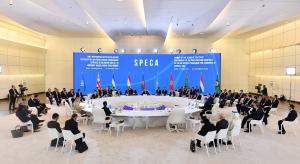
Meeting for the first time since the United Nations Special Programme for the Economies of Central Asia (SPECA) was created in 1998, the Heads of State and Government of SPECA participating States adopted the Baku Declaration. The declaration endorses a roadmap for the digitalization of multimodal data and document exchange along the Trans-Caspian Transport Corridor and welcomes plans to establish a dedicated SPECA Multi-Partner Trust Fund.
The Summit marked the end of SPECA Week organized by Azerbaijan as the 2023 Chair to mark the Programme’s 25th anniversary.
“We live in a world that is increasingly interconnected, and economic opportunities and challenges transcend borders. The SPECA programme recognizes that reality, aiming to foster economic growth, reduce inequalities, and enhance the prosperity of the region. It places strong emphasis on cross-border cooperation, trade facilitation, and the harmonization of economic policies. Given the diversity of our region, such collaboration is indispensable for unlocking its full economic potential,” noted Mikayil Jabbarov, Minister of Economy of Azerbaijan.
Looking at the prospects for the SPECA region in the next 25 years, UNECE Executive Secretary Tatiana Molcean underlined its sustained economic dynamism, increasingly educated and expanding workforce, improved infrastructure and varied resource endowments.
“With such characteristics, the region can look forward to a more prosperous future, where cooperation will foster sustainable prosperity. These positive trends and opportunities call for even more regional cooperation, underpinned by a strong multilateral platform, practical tools, and strong partnerships. One such tool is the SPECA Multi-Partner Trust Fund under UN management. But beyond the Fund, it will be crucial to make SPECA a connecting platform for a wider set of partners, including the neighbouring countries, the key regional organizations and the international financial institutions,” said Ms. Molcean.
Digitalizing the Trans-Caspian Transport Corridor
Highlighting the importance of the Trans-Caspian trade and transport corridor as one of the most efficient and sustainable links between Asia and Europe, the participants of the SPECA Week called for improvement of transport connectivity throughout the corridor by enhancing effective communications between transport companies, freight forwarders, logistics centres, and national operators.
The Roadmap for the Digitalization of Multimodal Data and Document Exchange along the Trans-Caspian Transport Corridor endorsed at the Summit will help ensure seamless, real-time data exchange across supply chains and enhancing transport efficiency using the UN digital standards and legal instruments in SPECA participating States by 2027.
It stipulates, among other things, using digital standards to ensure data interoperability across different transport modes, and implementing smart transport solutions including the eTIR international system based on the UNECE TIR Convention.
It also emphasizes participation in business-to-business (B2B) operational supply chain data exchanges, multimodal freight information interoperability, aligning port community systems with UN/CEFACT standards and the use of eCMR based on the UNECE CMR Convention.
The implementation of the roadmap will require a strong capacity-building component benefitting both the public and private sectors in the SPECA participating. SPECA Working Groups on trade, transport, and innovation will be engaged to strengthen work in support of this initiative.
A vision for a more sustainable SPECA region
The SPECA Week in Baku was also a time of reflection on the future of the SPECA region and the role the programme going forward.
One key topic for the region is energy connectivity and the shift to greener and more sustainable energy sources. “Central Asia and the broader Euro-Asian region hold significant renewable energy potential, particularly in solar and wind energy. Harnessing this potential is not just an environmental imperative but a strategic economic opportunity”, noted Dmitry Mariyasin, UNECE Deputy Executive Secretary.
Participants of the SPECA Week have also discussed a range of issues related to environmental sustainability, the water and energy nexus and the effects of climate change on the region. Such topics as the need for stronger cooperation on transboundary waters, the challenges of migration driven by climate change and the importance of city-level cooperation were discussed. Among the specific proposals made during the Week was creating a Forum of Cities within SPECA.
Gender equality was a special emphasis of discussions during the week: participants stressed the need to accelerate gender equality and the economic empowerment of women as a means of transformation within the SPECA region.
For the region to realise its full potential, the equal participation of women in regional economies, workforces and at decision making tables must be achieved. Ambitions of transformation will be more likely to succeed, if gender equality is a central feature of that transformation, noted Ms. Sadagat Gahramanova, Chair of the SPECA Working Group on Gender and the Sustainable Development Goals.
Note to editors
The United Nations Special Programme for the Economies of Central Asia (SPECA) was launched in 1998 to strengthen subregional cooperation in Central Asia and facilitate its integration into the world economy. The SPECA participating States are Afghanistan, Azerbaijan, Kazakhstan, Kyrgyzstan, Tajikistan, Turkmenistan, and Uzbekistan. UNECE and the United Nations Economic and Social Commission for Asia and the Pacific (UNESCAP) jointly provide overall support and coordination to the programme on the principle of annual rotation. Find out more here.
Photo credit: Government of Azerbaijan

